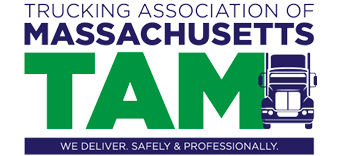TAM Testimony – Concerning House Bill 3980, An Act to Promote Commercial Driving Safety
On Jan. 2, Kevin Weeks, the executive director of the Trucking Association of Massachusetts, submitted written testimony relative to House Bill 3980, An Act to Promote Commercial Driving Safety. The testimony is provided below, and a PDF is available for download.
For additional information, contact the Trucking Association of Massachusetts.
Honorable William Straus, House Chair
Honorable Joseph Boncore, Senate Chair
Joint Committee on Transportation
State House, Room 134
Boston, Massachusetts 02133
Dear Chair Boncore, Chair Straus and Members of the Committee:
On behalf of the Trucking Association of Massachusetts (TAM), I am writing relative to House Bill 3980, An Act to Promote Commercial Driving Safety. TAM, which has a proven history of supporting increased public safety measures, respectfully requests that this legislation be amended to reflect a variety of practical considerations that will not impact the public safety objectives of this legislation.
As you know, TAM has been the voice of the trucking industry in Massachusetts since 1919. One of the oldest transportation associations within the Commonwealth, our membership represents a wide variety of companies ranging from small, family owned trucking companies with a single truck to large national trucking companies with thousands of trucks. The trucking industry within the Commonwealth is responsible for transporting 87%-93% of all goods and products found in our homes and workplaces. In addition to being a key facilitator for the growth of other industries, the trucking industry is a significant creator of jobs within the Commonwealth. As a recent study by the Dukakis Center for Urban Research & Policy at Northeastern University stated “[t]he overall trucking industry (including private and for-hire tucking) represent about one in 12 jobs or about 300,000 jobs in Massachusetts in 2017. And, trucking companies meet all Massachusetts freight movement needs.” (“The Importance of the Trucking Industry to the Massachusetts Economy”, Pritchard, R. & Scott, A., p.3 (May 2018)).
Most importantly, TAM and its members work to ensure that the Commonwealth’s roadways are safe for the general public as well as commercial motor vehicles. Safety is the single most important consideration for trucking companies or companies with trucking fleets – whether hauling hazardous materials, household goods or food products. As a result, TAM and its members work closely with local, state and federal officials to ensure that drivers are appropriately trained and licensed; tractors and trailers are legally compliant and safe for operation, and best management practices for reducing risk are employed every day.
In reviewing, HB3980, TAM respectfully requests that the Committee consider the following four areas for potential amendment:
(1). Section 11: Three years clear driving history and the unintentional increase to the minimum age for a CDL. A plain reading of Section 11 of HB3980 would appear to push the Commonwealth’s minimum driving age for acquiring a CDL license to 19+. Specifically, the bill’s language states: “An applicant for a commercial driver’s license shall be a duly licensed motor vehicle operator for a period of 3 continuous years immediately prior to his or her application.”. In the Commonwealth, the earliest an individual can obtain a junior driver’s license is 16 ½ years old. A requirement for a three year period of clear driving would accordingly push the minimum age for acquiring a CDL to 19½ years of age. This will push the minimum age qualification for an intrastate CDL from the current standard of 18 years of age. Given that an 18 year old may currently hold a CDL for in-state operation of a commercial motor vehicle, HB3980 will harm employers who utilize 18 year old to 19½ year old intrastate operators.
(2). Section 11: Prohibition for obtaining a CDL and the types of infractions which cause a suspension. HB3980 would prohibit the issuance of a CDL due to a wide range of previously committed offenses resulting in a suspended license for the applicant. However, the list of offenses that could result in the suspension of the CDL applicant’s Class D driver’s license contains a number of offenses that have nothing to do with driving. For example, a license suspension resulting from Mass. Gen. Laws ch. 266, §126A ( “tagging”, aka grafitti) or Mass. Gen. Laws ch. 90, §22G (“littering”) would prevent an individual from ever being eligible for a CDL. While not condoning such action, it is still difficult to understand why offenses unrelated to driving or, even, not actual moving violations should prevent an applicant from applying for a CDL. (Note: if a standard needs to be restated, consider instead using the criteria established in Melanie’s law, Chapter 122 of the Acts of 2005, already used by trucking companies / truck driving schools.).
(3). Section 11: Grandfathering students currently in truck driving schools or training programs. Under Section 11’s prohibitions for acquiring a CDL, the enactment of HB3980 would potentially harm students, enrolled at that time, in truck driving schools or training programs, who would otherwise be disqualified from driving a truck. Under existing law, potential applicants for CDLs are not in jeopardy because of a previous license suspension due to littering, the failure to pay child support or a similar type of infraction. However, the enactment of HB3980, without some type of grandfathering clause, would cause financial and other harms to these individuals, who started a truck driving school or training program before they knew they would be prohibited from obtaining a CDL. Accordingly, TAM respectfully requests that a provision be included within the legislation to “grandfather” any students in a truck driving or training program at the time any potential law is made effective.
(4). Section 16: Definition of employers. This section requires employers to register for the Registry of Motor Vehicles’ (RMV’s) free driver verification service (DVS) service. The question from many of the companies within a number of industries is simple – how far does the definition of employer extend? For example, if a national company has many out of state CDL holders and a few CDL holders licensed in Massachusetts, must it sign up for the RMV’s DVS for every employee or independent contractor? Likewise, if an employer already uses a “pay” service that exceeds the requirements of the DVS, must an employer register for a second, redundant service? Again, TAM welcomes the opportunity to work with the Committee to clarify these questions in the proposed law so that the Commonwealth’s roadways are made safer without unnecessarily harming employers or their employees.
Trucking is a heavily regulated industry. The laws and regulations, whether federal or state, that oversee the industry ensure that both drivers and their equipment meet stringent safety standards and training. TAM appreciates the thought that has gone into HB3980; it is a piece of legislation that aims to close potential loopholes in the CDL law. The legislation’s provisions implementing a reasonable electronic device hands-free prohibition, penalties for inappropriate approaches to railroad crossings and empowering the RMV to suspend a CDL on notice from another government entity are laudable public safety measures. With that in mind, TAM, through the four aforementioned points listed above, seeks to make the legislation before the Committee one that protects the public, yet understands the practical considerations trucking companies must address in order to comply with the proposed law.
I appreciate your consideration of this important matter. If you have any questions or concerns, please do not hesitate to let me know.
Sincerely,
Kevin Weeks
Executive Director



